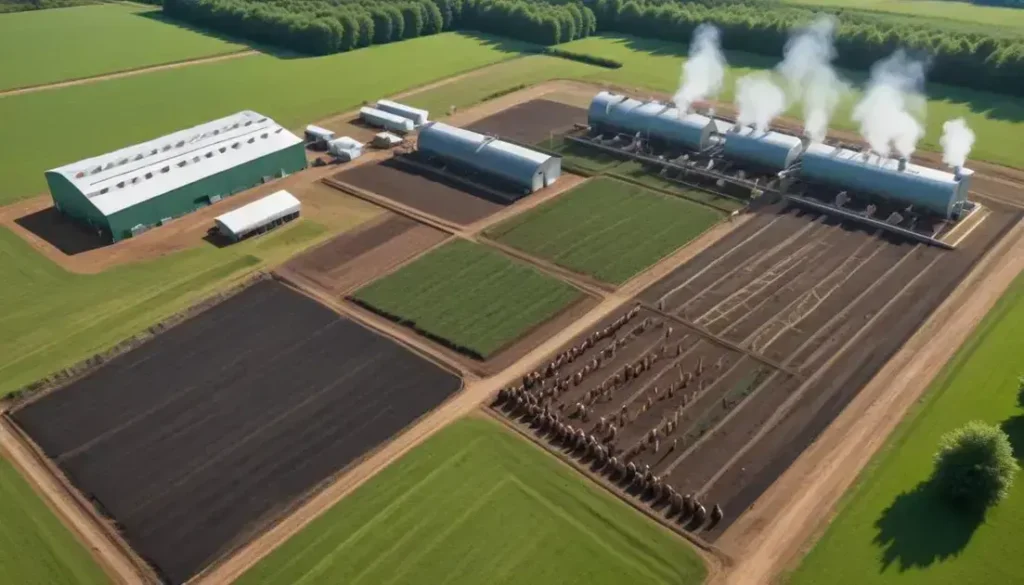Bunge’s sustainability initiatives impact the Indian agriculture sector by promoting regenerative practices, reducing emissions, and enhancing supply chain traceability, ultimately supporting farmers and contributing to environmental health.
In today’s world, the importance of sustainability cannot be overstated, especially for global companies like Bunge. Their initiatives in agriculture present significant opportunities and challenges.
Introduction to Bunge’s Sustainability Initiatives
Bunge has taken significant steps to enhance its commitment to sustainability across its operations. By focusing on regenerative agriculture, the company aims to bolster productivity while ensuring environmental health. This innovative approach not only increases soil fertility but also contributes to carbon sequestration, helping to mitigate climate change.
One of the core aspects of Bunge’s initiatives is the reduction of emissions across all operational scopes, including Scope 1, 2, and 3. Embracing cleaner technologies and optimizing logistics are vital strategies in this pursuit. Bunge actively seeks to minimize its carbon footprint, which has a direct positive impact on the agricultural community, particularly in developing regions, including India.
Furthermore, Bunge is enhancing traceability within its supply chain to ensure transparency. This effort involves collaborating with farmers and suppliers to implement sustainable practices that align with global standards. By doing this, Bunge not only elevates its offerings but also supports local agricultural economies by fostering trust and accountability.
As these initiatives unfold, they present a unique opportunity for Indian farmers to engage with global markets more effectively, ultimately driving towards a more sustainable future in agriculture.
Role of Regenerative Agriculture
Regenerative agriculture plays a crucial role in improving the sustainability of farming practices. This holistic approach focuses on restoring soil health, enhancing biodiversity, and increasing ecosystem resilience. By utilizing practices such as crop rotation, cover cropping, and reduced tillage, farmers can significantly enhance soil fertility and moisture retention.
One of the primary benefits of regenerative agriculture is its potential for carbon sequestration. Through improved soil management, agricultural lands can capture and store atmospheric carbon, helping to mitigate climate change. This not only reduces greenhouse gas emissions but also contributes to a healthier environment for future generations.
Moreover, regenerative practices often lead to increased yields over time. Healthy soils are more productive, providing farmers with the ability to grow diverse crops while minimizing the need for chemical fertilizers and pesticides. This transition benefits both the farmers and consumers, as it leads to fresher, more nutritious food options.
Bunge recognizes the importance of regenerative agriculture and actively supports farmers in adopting these techniques. By investing in training and resources, they empower agricultural communities to embrace sustainability, therefore enhancing the overall health of the planet.
Reduction of Emissions Across Scope 1, 2, and 3
Reducing emissions is a top priority for Bunge, emphasizing their commitment to sustainability across all operational levels. This involves addressing emissions from three distinct scopes: Scope 1, Scope 2, and Scope 3. Each scope represents different sources of greenhouse gases, and understanding them is vital for effective management.
Scope 1 covers direct emissions from owned or controlled sources. Bunge aims to implement cleaner technologies in their facilities, focusing on energy efficiency and the adoption of renewable energy sources. By modernizing infrastructure, the company can substantially reduce its overall carbon footprint.
Scope 2 pertains to indirect emissions from the generation of purchased electricity, steam, heating, and cooling. To mitigate these emissions, Bunge collaborates with energy suppliers to source cleaner energy, incorporating more sustainable options into their power supply chain.
Finally, Scope 3 includes all other indirect emissions, such as those resulting from the supply chain and product use. Bunge engages with its partners—including farmers and suppliers—to promote sustainable practices throughout the entire process. By prioritizing sustainability, Bunge not only meets regulatory standards but also improves its market position and enhances corporate responsibility.
Enhanced Traceability in Supply Chains
Enhanced traceability in supply chains has become a pivotal element for companies aiming for sustainability. Bunge recognizes the critical need for transparency, allowing consumers to know the origins of their food products. By improving traceability, Bunge can ensure that all agricultural practices meet stringent sustainability standards.
Through advanced technologies, such as blockchain and IoT sensors, Bunge is able to monitor the journey of its products right from the farm to the consumer’s table. This real-time data collection enables quicker response times to any potential issues, ensuring quality and safety throughout the supply chain.
Moreover, traceability facilitates better collaboration between Bunge and its suppliers. By sharing data on farming practices, quantities, and sustainability metrics, both parties can work together to improve practices and reduce environmental impacts. This not only builds trust but also encourages suppliers to adopt more sustainable methods.
Implementing enhanced traceability also helps in adhering to regulatory requirements and improving brand reputation. Consumers are increasingly demanding transparency, and meeting these expectations can significantly boost market competitiveness. Ultimately, Bunge’s commitment to enhanced traceability not only supports their sustainability goals but also fosters a more resilient and ethical agricultural system.
Global Collaboration for Sustainable Practices
Global collaboration is essential for promoting sustainable practices in agriculture. Bunge actively engages with various stakeholders, including governments, NGOs, and industry partners, to create a unified approach towards sustainability. This collaborative effort aims to address the pressing challenges of climate change and resource scarcity.
Through these partnerships, Bunge shares knowledge and best practices, helping to elevate sustainability standards globally. Collaborative programs often focus on resource efficiency, promoting methods that reduce waste, conserve water, and enhance soil health. By working together, participants in these programs can leverage each other’s strengths to implement effective strategies.
Furthermore, Bunge’s global collaboration extends to smallholder farmers, who play a crucial role in the agricultural supply chain. By providing access to resources such as training, technology, and financing, they empower these farmers to adopt sustainable practices. This not only improves their productivity but also helps in building resilient communities.
Such initiatives foster innovation, allowing for the development of new technologies that support sustainable agriculture. As Bunge continues to collaborate on a global scale, they pave the way for a more sustainable future while ensuring food security and environmental stewardship.
Impact on Indian Agriculture Sector
The impact on the Indian agriculture sector from Bunge’s sustainability initiatives is significant. As one of the leading agricultural companies, Bunge is committed to enhancing agricultural practices that directly affect Indian farmers. By introducing sustainable farming methods, Bunge supports increased crop yields and improved soil health, which are essential for the livelihoods of farmers.
Bunge’s focus on regenerative agriculture translates to innovative techniques that conserve resources and enhance the ecosystem. Through training programs and resources, Indian farmers are empowered to adopt these practices, leading to better productivity and sustainability in their operations.
Moreover, the partnership between Bunge and local agricultural communities fosters an understanding of sustainable practices. This not only benefits farmers by increasing their income but also contributes to the overall economic development of rural areas in India. With enhanced traceability practices, consumers can also feel confident in the quality and origin of their food.
By investing in sustainable agriculture, Bunge aids India in addressing critical issues such as food security and environmental impacts. The long-term effects of these initiatives promise a more resilient agricultural sector capable of adapting to climate change and global market demands.
Conclusion and Future Directions
As Bunge advances its sustainability agenda, the focus on long-term impacts becomes increasingly important. The integration of sustainable practices within the agricultural sector not only addresses immediate challenges but also lays the groundwork for future resilience. By prioritizing regenerative agriculture, Bunge is helping to transform traditional farming methods into more sustainable practices that benefit both the environment and farmers.
Looking ahead, Bunge aims to enhance its collaborations with various stakeholders to expand sustainable initiatives. This includes partnerships with local farmers, governmental organizations, and research institutions. By fostering this network, Bunge can better share resources and innovations that drive sustainable growth.
Additionally, the ongoing investment in technology, such as data analytics and precision agriculture, will play a vital role in optimizing agricultural practices. These advancements will enable farmers to make informed decisions, reducing waste and increasing efficiency. As consumer demand for transparency grows, Bunge’s commitment to enhanced traceability will further ensure ethical practices throughout the supply chain.
Ultimately, Bunge’s dedication to sustainability signifies not just a corporate responsibility but a necessary evolution in agriculture. By focusing on sustainability now, Bunge paves the way for a thriving agricultural future, benefiting both the economy and the environment.
In conclusion, embracing sustainability in agriculture
Bunge’s commitment to sustainability is vital for the future of agriculture, especially in India. By focusing on regenerative practices, reducing emissions, and enhancing traceability, Bunge not only supports farmers but also contributes to environmental health.
As the agriculture sector evolves, collaboration with stakeholders will ensure that sustainable practices become the norm. Investment in technology will drive efficiency and transparency, benefiting everyone involved in the supply chain.
Ultimately, Bunge’s efforts highlight the importance of sustainable agriculture in addressing global challenges, ensuring food security, and protecting the planet for future generations.
Embracing these initiatives is not just a corporate responsibility, but a necessary step towards a thriving agricultural landscape.
Frequently Asked Questions
How does sustainability benefit the agricultural sector?
Sustainability practices improve soil health, increase crop yields, and enhance the resilience of farming systems, ultimately leading to better economic returns for farmers.
What role does technology play in sustainable agriculture?
Technology, such as precision farming tools and data analytics, helps farmers make informed decisions, reduces waste, and optimizes resource use in agricultural practices.
How can Bunge support local farmers?
Bunge supports local farmers through training programs, providing resources for sustainable practices, and fostering partnerships that enhance productivity and income.
Why is traceability important in supply chains?
Traceability ensures transparency, allowing consumers to know the origin of their food, while also helping companies verify sustainability practices throughout the supply chain.
What initiatives is Bunge implementing for emission reduction?
Bunge is focusing on reducing emissions across Scope 1, 2, and 3 by adopting cleaner technologies, optimizing logistics, and promoting sustainable practices among suppliers.
How can consumers contribute to sustainable agriculture?
Consumers can support sustainable agriculture by choosing products from companies that prioritize eco-friendly practices, thereby encouraging more brands to adopt similar initiatives.


